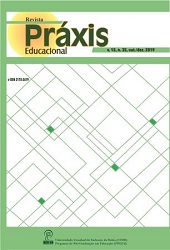METODOLOGÍAS ACTIVAS Y PARTICIPATIVAS: SUS CONTRIBUTOS PARA EL ACTUAL ESCENARIO EDUCACIONAL
DOI:
https://doi.org/10.22481/praxisedu.v15i35.5673Palabras clave:
Metodologías activas y participativas, Enseñanza de adultos, Formación professionalResumen
The so-called "participatory and active teaching methodologies", one of the main approaches of contemporary teaching, defend the centrality of the learner’s (pro) active role in the architecture of his/her learning process. Advocating that learning takes place in actual time and real contexts, close to the circumstantiality of the subjects, incorporating a high level of motivation and personal engagement, these methodologies are considered as the most favorable to discuss and deal with the professional, social and personal challenges that learners face. There are many studies that are currently carried out in the field of active methodologies. However, they are mainly directed to the application of these methodologies in certain learning contexts, and there seems to be a gap in the discussion of its general principles and bases. Thus, the objective of this article is to collaborate for this discussion, elaborating a framework of the main definitions of these methodologies, the underlying epistemological principles, as well as their limitations, potentialities and more recent perspectives. Methodologically, this is a conceptual synthesis of literature, based on reference documents in the field, especially considering those who analyze the use of these methodologies in adult education and vocational training. As a result, we argue that active and participative methodologies can collaborate to qualify adult education and professional training, whereas they are not restricted to instrumentalize the formative process, but organized to promote deep learning both in terms of understanding, and on the development of skills and engagement with the value of personal and community’s life.
Descargas
Descargas
Publicado
Número
Sección
Licencia
Você é livre para:
Compartilhar - copia e redistribui o material em qualquer meio ou formato; Adapte - remixe, transforme e construa a partir do material para qualquer propósito, mesmo comercialmente. Esta licença é aceitável para Obras Culturais Livres. O licenciante não pode revogar essas liberdades, desde que você siga os termos da licença.
Sob os seguintes termos:
Atribuição - você deve dar o crédito apropriado, fornecer um link para a licença e indicar se alguma alteração foi feita. Você pode fazer isso de qualquer maneira razoável, mas não de uma forma que sugira que você ou seu uso seja aprovado pelo licenciante.
Não há restrições adicionais - Você não pode aplicar termos legais ou medidas tecnológicas que restrinjam legalmente outros para fazer qualquer uso permitido pela licença.












